15 Foods Nutritionists Eat Every Day—and So Should You
Updated: May 23, 2023
If you want a healthy diet, why not take tips from the experts: Nutritionists reveal the foods they eat every day—and why they should be on your menu.
Nuts
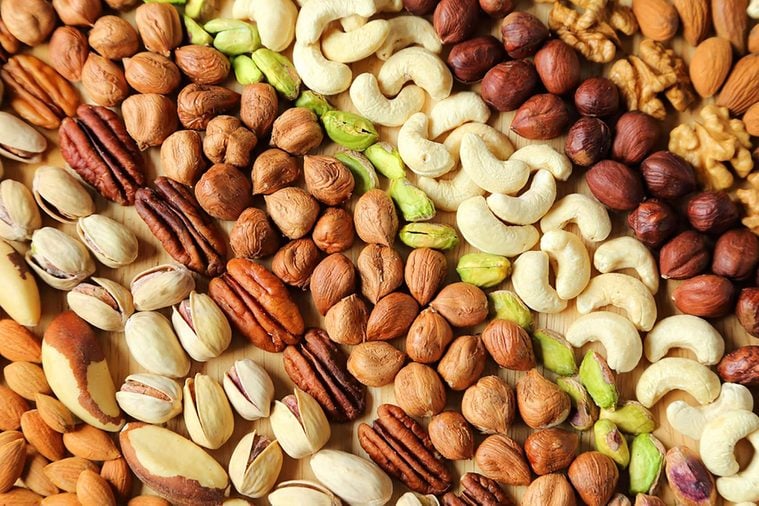
Nutritionists are nuts about nuts, and for good reason. They provide plant-based protein, heart-healthy fats, and fiber to keep you feeling satisfied. Registered dietitian nutritionist Kristie LeBeau eats nuts every day because “research has shown they have many health benefits including promoting a healthy weight and a reduction in heart disease risk factors.”
Kate Chury, RD, makes it a habit to eat two Brazil nuts every day because they’re rich in selenium. “Selenium is an essential micronutrient that has antioxidant properties and is involved in thyroid health, the immune system, and fertility,” Chury says. Studies suggest that eating two Brazil nuts a day can improve selenium status, she says. Find out the dangers of a selenium deficiency.
Leafy greens
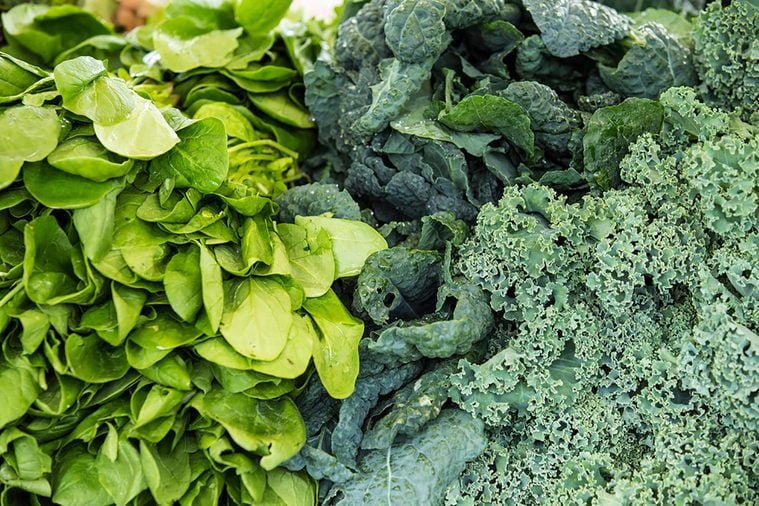
Whether it’s spinach or kale in their smoothies, big salads at lunch or roasted brussels sprouts at dinner, greens are on nutritionists’ daily menu. They’re rich in nutrients such as folate, a B vitamin you need for healthy red blood cells, beta-carotene and lutein for healthy eyes, and vitamin K for blood clotting.
Melissa Groves, RDN, eats her greens daily. She explains, “A recent study showed that people who ate at least one serving a day of leafy greens experienced slower cognitive decline than people who didn’t, equating to being 11 years younger!”
Berries
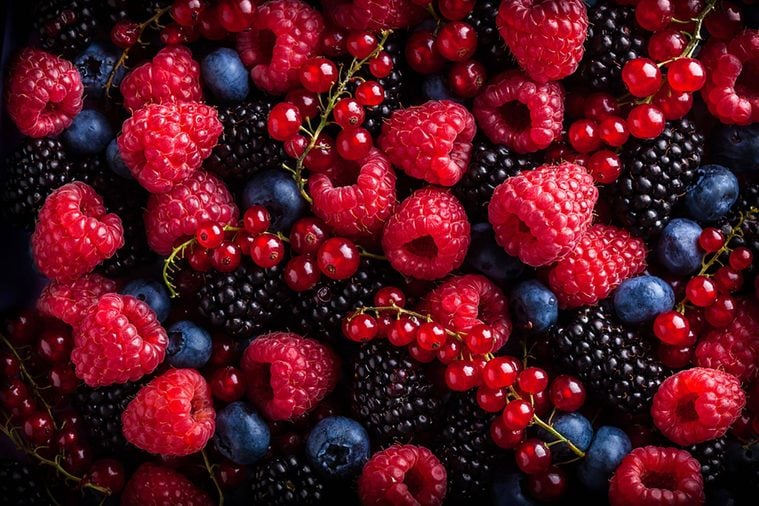
Nutritionists love raspberries, blackberries, strawberries, and blueberries because they’re all rich in fiber and vitamin C, which acts as an antioxidant. A recent study found that older adults who get the equivalent of one cup of fresh blueberries every day (they took it in the form of 24 grams of freeze-dried blueberry powder) did better on tests of brainpower than people who got a placebo. Talk about brain food!
Avocado
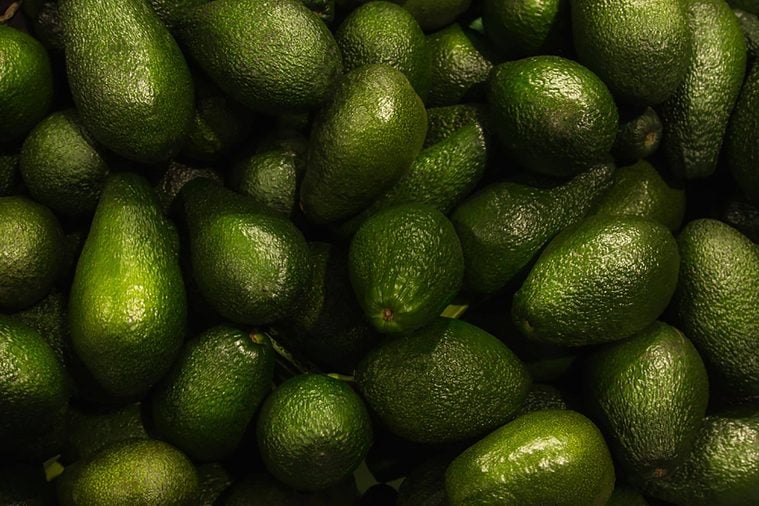
As a nutritionist, I have some avocado every day on toast, as a dip for vegetables, and as a good fat in my desserts. Try my Chocolate Avocado Truffles and my Mint Chocolate Avocado Pudding for healthy treats you can feel good about eating. Avocados are packed with heart-healthy monounsaturated fat, also known as omega-9s. This creamy fruit is also a good source of fiber for healthy digestion. Plus, avocados are a good source of vitamin K, a nutrient that’s important for bone health.
Greek yogurt
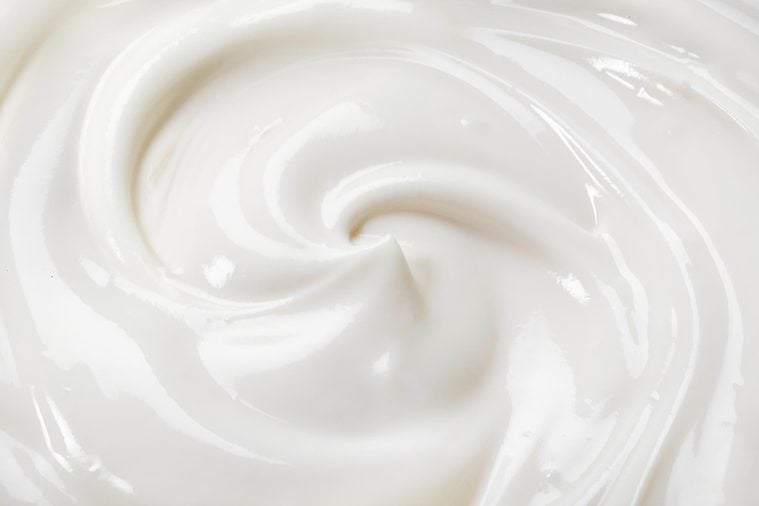
Yogurt gets top marks from nutritionists thanks to its healthy probiotic bacteria. Most choose Greek yogurt for an extra boost of protein for muscle growth and maintenance. According to Joan Salge Blake, RD, “Many Americans are falling short on their daily calcium. A cup of plain Greek yogurt provides about 1/4 of the calcium needed daily by most Americans.”
Jess Cording, RDN, agrees: “Aside from providing satisfying protein, the probiotic bacteria in the yogurt are beneficial for digestive health, immune system function, and supporting clear gut-brain communication.”
Beans
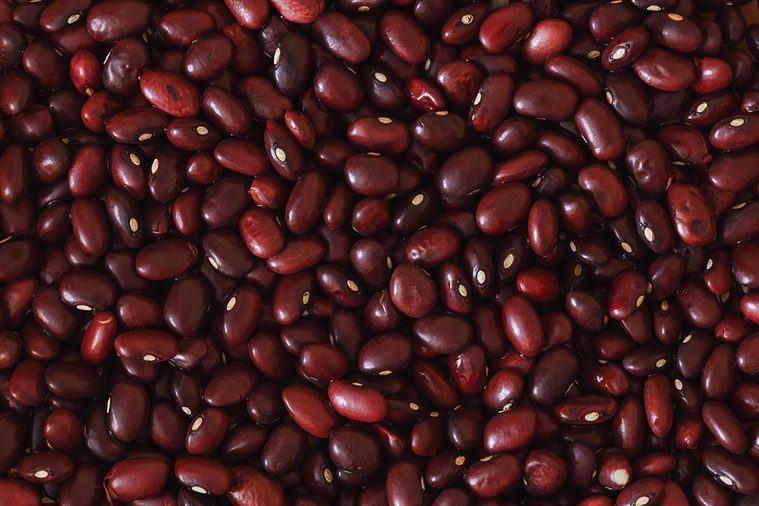
Not only are beans high in fiber, they’re rich in plant-based protein. Nutritionists love beans, lentils, and chickpeas (collectively known as pulses) in everything from chili, pasta, and soups to salads and pureed into baked goods. Jessica Spiro, RD, says she eats beans every day because “they contain a variety of vitamins and minerals including B vitamins, iron, and zinc. They are also affordable and versatile.”
Registered dietitian Sharon Palmer points out that pulses are an important part of her daily menu thanks to their disease-fighting phytochemicals. Some of these compounds could protect cells from damage that’s linked to cancer, especially colon cancer.
Oats
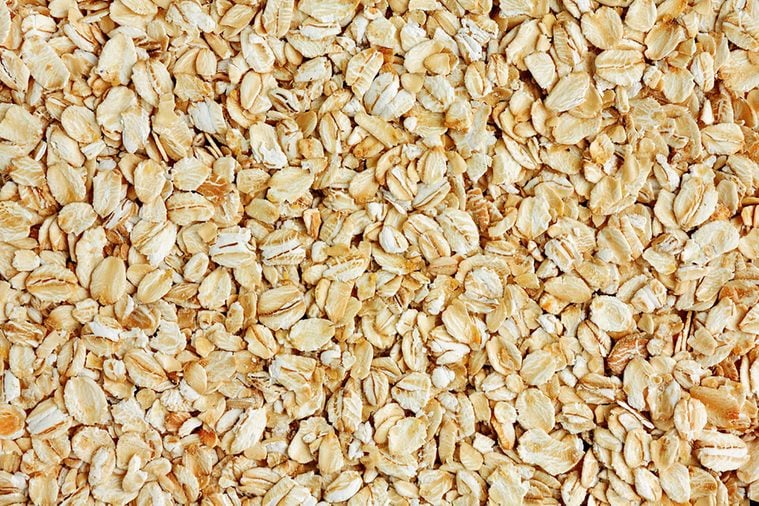
Fiber-rich oats hold a special place in the hearts of nutritionists—and it’s time to welcome them into your day! Eating oats helps lower unhealthy LDL cholesterol levels, so they’re a great choice for heart health. Registered dietitian and new mom Dianna Dillon shares that, “Oats are super filling and loaded with soluble fiber—specifically beta glucan—to keep me feeling full and fueled. I also love them because they support lactation.”
Simone Schmaldienst, RD, eats oats daily to up her fiber intake. Oats help promote good digestion and “provide B vitamins which support energy production for a successful workout,” she says.
Chia seeds
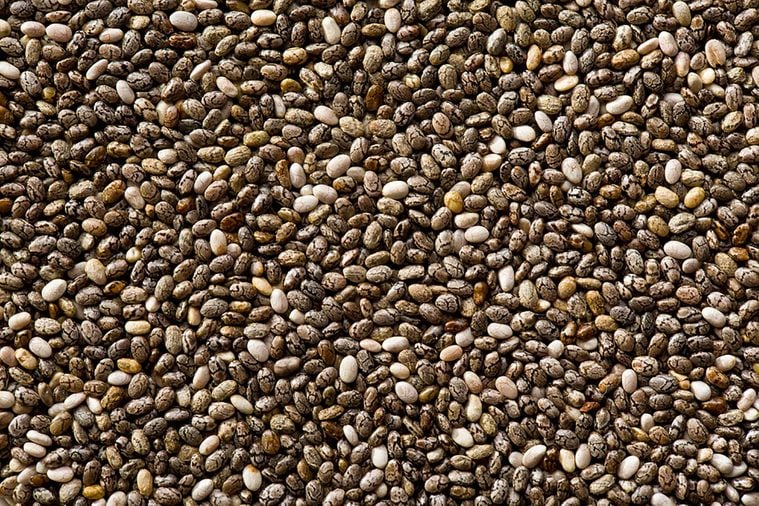
Low in carbohydrates and packed with fiber, omega-3 fatty acids, and protein, chia seeds are extremely filling. And have you ever seen what happens when you add chia seeds to water? They expand the same way they do in your digestive tract; that means they help you fill up faster and stay full longer. Some research suggests the seeds may also help control blood sugar levels, promote healthy digestion, and a healthy heart. Try my Cherry Chia Overnight Oats to get the health benefits of chia and several other foods on our list!
Peanut butter

Here’s why nutritionists love this great spread: “I eat peanut butter every day because peanuts contain arginine, resveratrol, and other antioxidants,” says registered dietitian Bridget Swinney. Peanut butter is also rich in niacin, a B vitamin that is needed for skin and nerve health and helps turn your food into energy—and it may help lower the risk of Alzheimer’s disease. This delicious spread is also an excellent source of vitamin E, a nutrient that acts as an antioxidant and can protect against coronary heart disease.
Expert tip: Make sure you choose natural peanut butter that doesn’t have sugar and other additives. Read the ingredients list—all you should see is peanuts and perhaps some salt.
Eggs
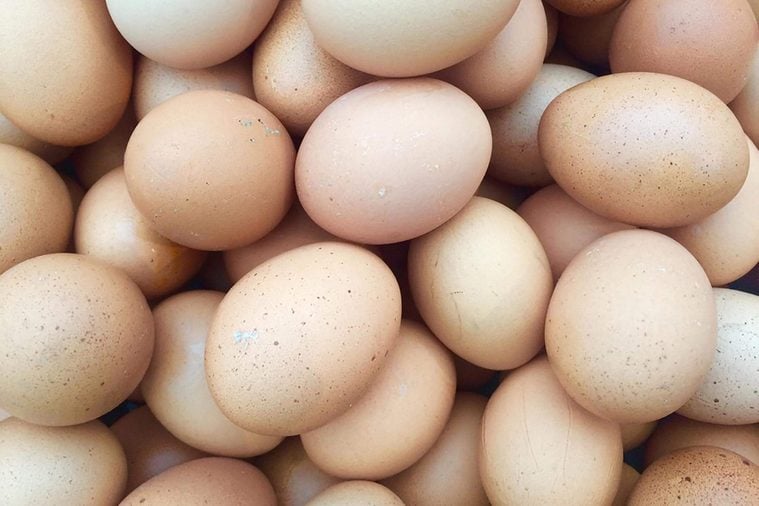
Scrambled, poached, or hard-boiled, eggs are a favorite of registered dietitian Shannon A. Garcia. As an expectant mom, she values eggs as a source of choline and quality protein. “Choline is an essential nutrient important throughout the lifespan. It’s especially important during pregnancy for both mom and baby, yet less than 10 percent of pregnant women are consuming the daily recommended intake.” Choline helps the body make use of other nutrients such as omega-3 fatty acids and B vitamins. Eggs also contain vitamin D, a nutrient that’s key for bone health. Registered dietitian Sarah Pflugradt eats eggs every day because “they contain lutein and zeaxanthin, nutrients that are important for eye health.” Learn how much water you should drink during pregnancy.
Sauerkraut and kimchi
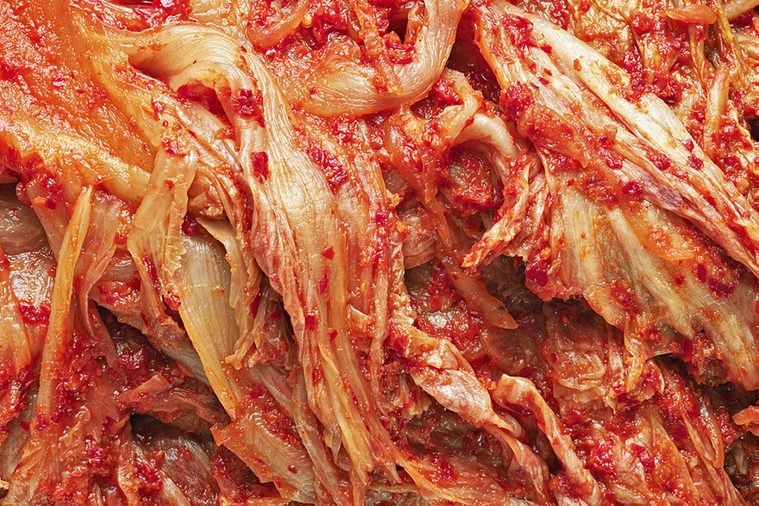
Fermented foods are gaining more attention in the nutrition world thanks to their positive effects on your gut microbiome. Sauerkraut and kimchi are both made from fermented cabbage, a food that’s naturally high in fiber and vitamins C and K. They’re also rich in glucosinalates, compounds that may help lower inflammation and potentially fight cancer. Says Michelle Loy, RD: “I eat fermented foods every day because they contain probiotics, which promote digestive health and may have additional benefits like weight management and mental health.”
Prunes
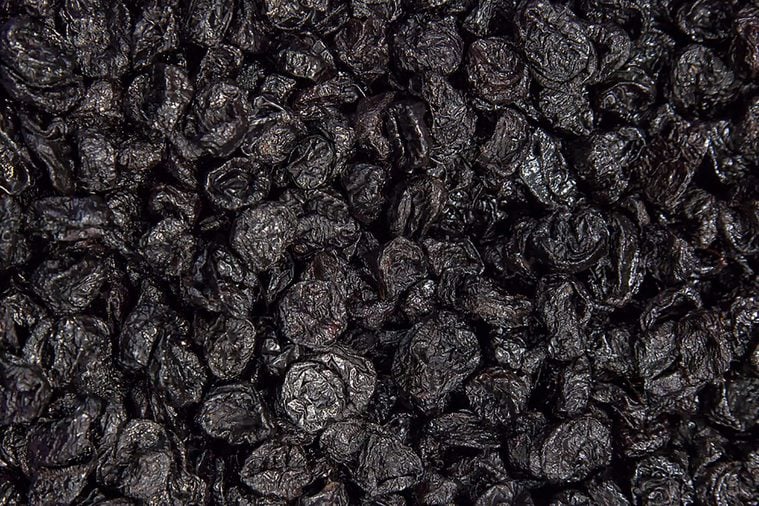
You may know that dried plums are great for keeping you regular, but nutritionists know there’s more to prunes. Dietitian Kara Golis says, “I eat a few prunes every morning. The potassium and magnesium in prunes support bone health. And unlike many dried fruits, prunes have a relatively low glycemic index, meaning that they are digested and absorbed slowly by the body.”
Try them as a healthier way to sweeten up your cereal, baked goods, and smoothies.
Extra virgin olive oil

This key ingredient in the heart-healthy Mediterranean diet is a daily addition to registered dietitians’ meals. Elena Paravantes Hargitt, RD, is one of them. “Apart from being a good source of monounsaturated fats, extra virgin olive oil contains numerous polyphenols and is associated with the prevention of several chronic diseases. It also increases the absorption of certain nutrients.”
Skim milk
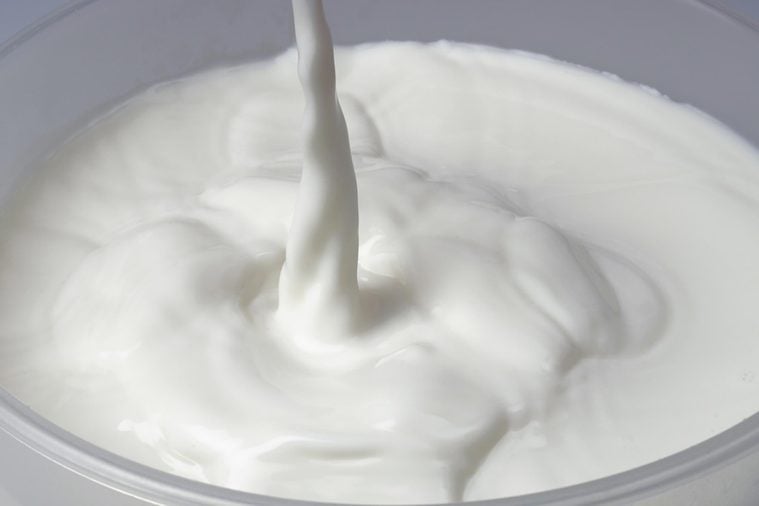
Drinking milk isn’t just for kids. Jessica Ivey, RD, adds skim milk to her diet every day. “Adequate calcium intake is essential to ensure that my peak bone mass is as high as possible. Skim milk provides bone-building calcium and vitamin D as well as protein but with zero grams of saturated fat,” she says.
Dark chocolate
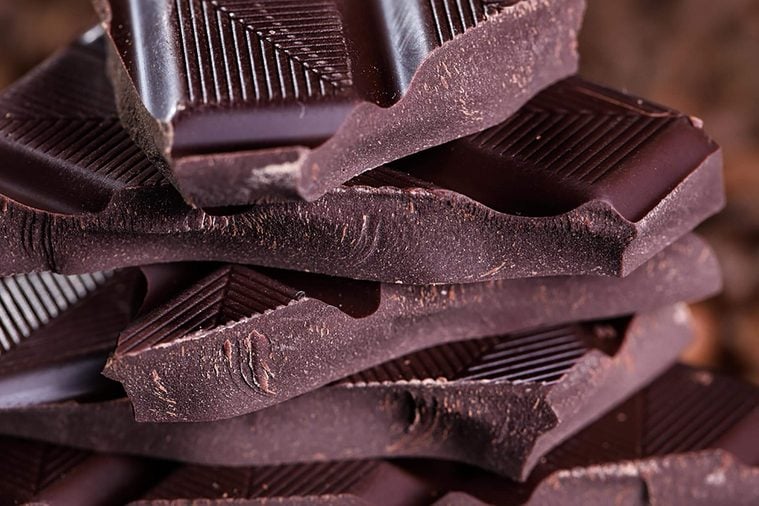
We all need some sweetness in our lives, and nutritionists sure do love their dark chocolate. Gram for gram, cocoa is one of the highest food sources of antioxidants. For example, two tablespoons of cocoa powder has more antioxidants than three cups of green tea. Plus, research suggests that having an ounce of dark chocolate four times a week may help reduce blood pressure and improve blood vessel function.



















